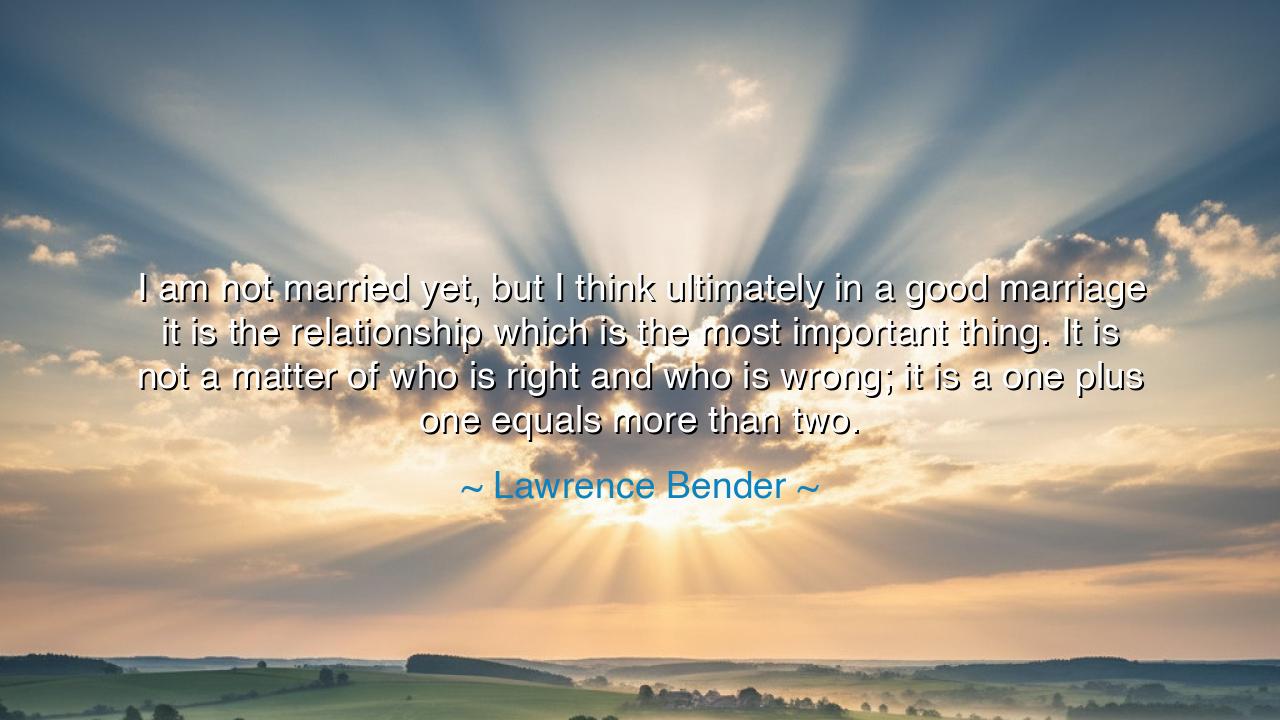
I am not married yet, but I think ultimately in a good marriage
I am not married yet, but I think ultimately in a good marriage it is the relationship which is the most important thing. It is not a matter of who is right and who is wrong; it is a one plus one equals more than two.






In the words of Lawrence Bender, creator, visionary, and quiet philosopher of the human heart, we find a truth both tender and profound: “I am not married yet, but I think ultimately in a good marriage it is the relationship which is the most important thing. It is not a matter of who is right and who is wrong; it is a one plus one equals more than two.” This statement, though humble in tone, carries the weight of ancient wisdom. For in it lies the essence of unity—that sacred power by which two souls, joined not by possession but by purpose, create something greater than either could alone. Bender speaks not as one who boasts of experience, but as one who observes with clarity: that love’s truest strength lies not in victory, but in harmony.
To understand the meaning of these words, one must look beyond the surface of numbers and reason. When Bender says “one plus one equals more than two,” he does not speak of arithmetic but of alchemy—the mysterious transformation that occurs when two beings merge their wills and dreams without losing their individuality. In most unions, the mind demands balance, fairness, and the tallying of faults. But love is not an argument to be won; it is a relationship, a living bridge between hearts. To insist on being “right” in love is to poison its soil with pride. The wise, therefore, seek not justice between lovers, but understanding—for only in understanding can the two become more than themselves.
Even the ancients understood this divine arithmetic. In the old tales of Odysseus and Penelope, their marriage was not perfect, nor without trial. He, the wanderer of seas and wars; she, the keeper of faith and home. Each was incomplete without the other—Odysseus’s cunning needed Penelope’s patience; her loyalty drew meaning from his long return. Together, their bond became greater than any single virtue. It was not who was right or wrong in their choices that mattered, but that they remained bound by a shared purpose, a shared soul. And in that enduring faithfulness, we see the living proof of Bender’s equation: when two hearts join in truth, they create more than life—they create legacy.
The origin of Bender’s thought likely lies in his own craft as a filmmaker and collaborator. In art, as in love, the greatest creations emerge not from control but from cooperation. A film, like a marriage, is made not by one voice but by many—each with vision, ego, and imperfection. Yet when those forces unite under a single purpose, something miraculous is born: a work of art, greater than any one hand could shape. In this, Bender found the reflection of his ideal marriage—a union where two individuals bring their unique strengths together not to dominate, but to amplify one another. He reminds us that love, like creation, is not competition—it is collaboration.
His words also carry a quiet warning to the proud and the stubborn. Many enter marriage with the desire to be right, to win every quarrel, to protect their own truth as if truth itself were a trophy. But love cannot thrive in the shadow of ego. When two people stand opposed, they become two walls, immovable and cold. But when they yield, when they bend as reeds in the same wind, they become a single tree whose roots intertwine, unbreakable. This is the wisdom behind Bender’s simplicity: that in marriage, peace is not found in triumph, but in surrender—the surrender of pride to love, and of isolation to unity.
Consider the life of Eleanor and Franklin Roosevelt, whose partnership endured not through ease, but through storms of politics, betrayal, and duty. They were not always aligned in affection, yet they shared a purpose larger than themselves—a vision for justice and humanity. Through that shared cause, they transformed their private struggles into public strength. Their relationship became more than companionship; it became service. And thus, “one plus one” truly became “more than two”—a union that shaped a nation.
The lesson of Bender’s words is clear and timeless: in love, do not seek victory—seek growth. Let the goal of union be not agreement, but harmony. Cherish the relationship more than your pride, and you will find that every conflict becomes a chance to deepen your bond. To love well is to build something that transcends the self, something that lives and breathes beyond the two who began it. And in this, the greatest arithmetic of all is revealed—that love multiplies, not adds; that in the alchemy of devotion, two souls become infinite.
Therefore, let those who walk the path of love remember: to be joined is not to lose the self, but to expand it. Do not cling to the need to be right, for in doing so you may lose what is most precious. Instead, cultivate a relationship in which kindness outweighs correctness, and unity triumphs over ego. For when two hearts choose to walk as one, the sum of their being becomes immeasurable—proof that in the sacred art of love, one plus one truly equals more than two.






AAdministratorAdministrator
Welcome, honored guests. Please leave a comment, we will respond soon